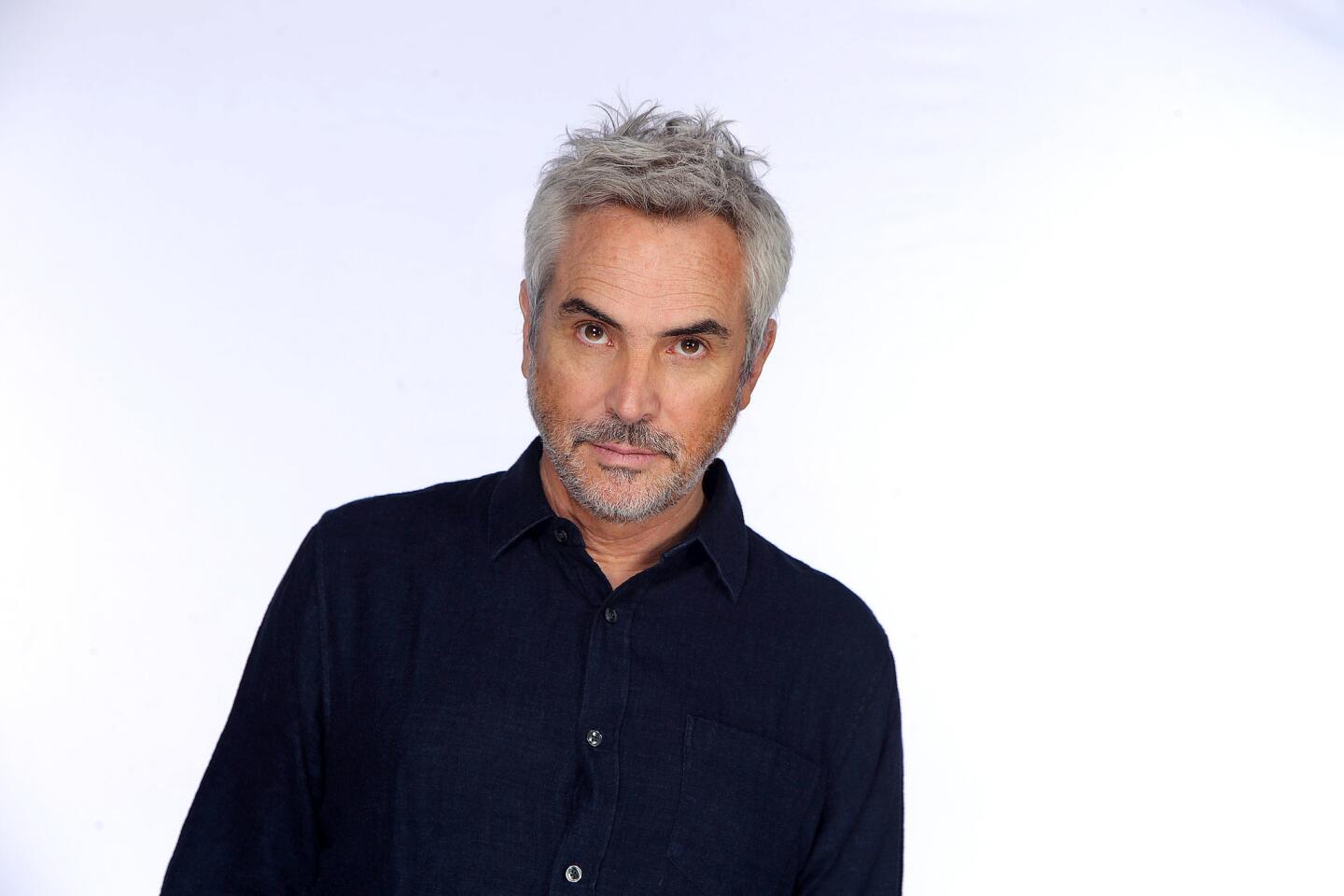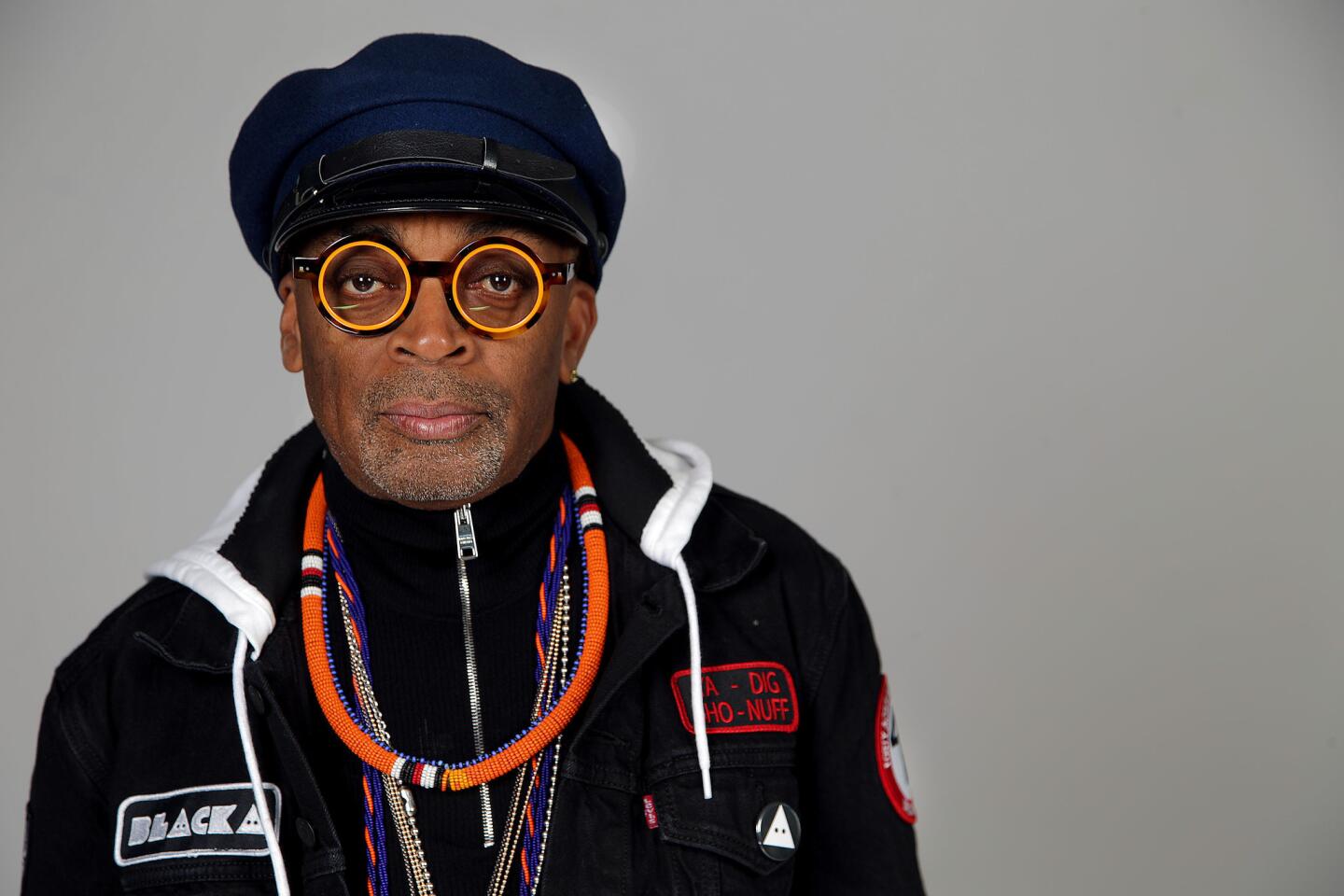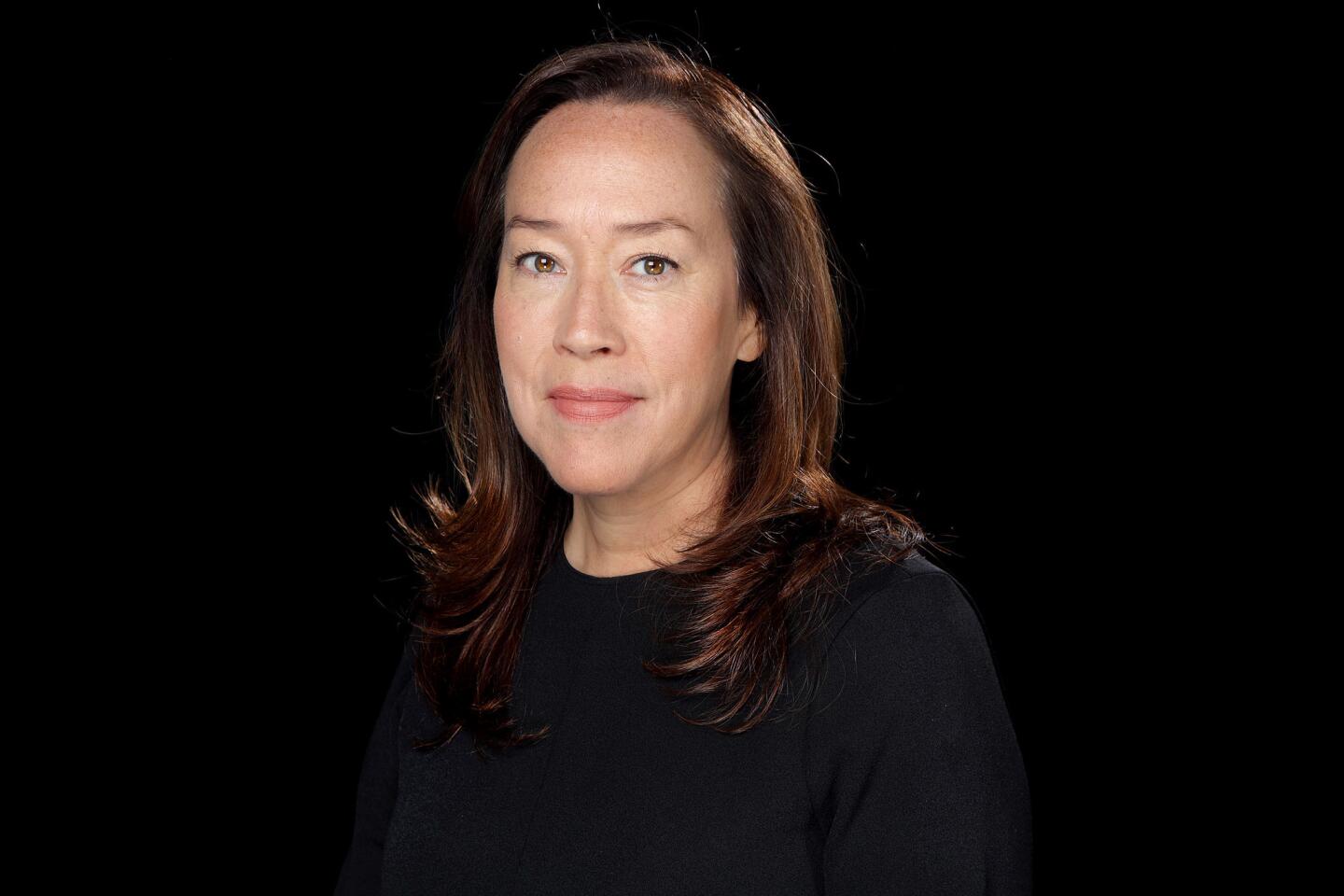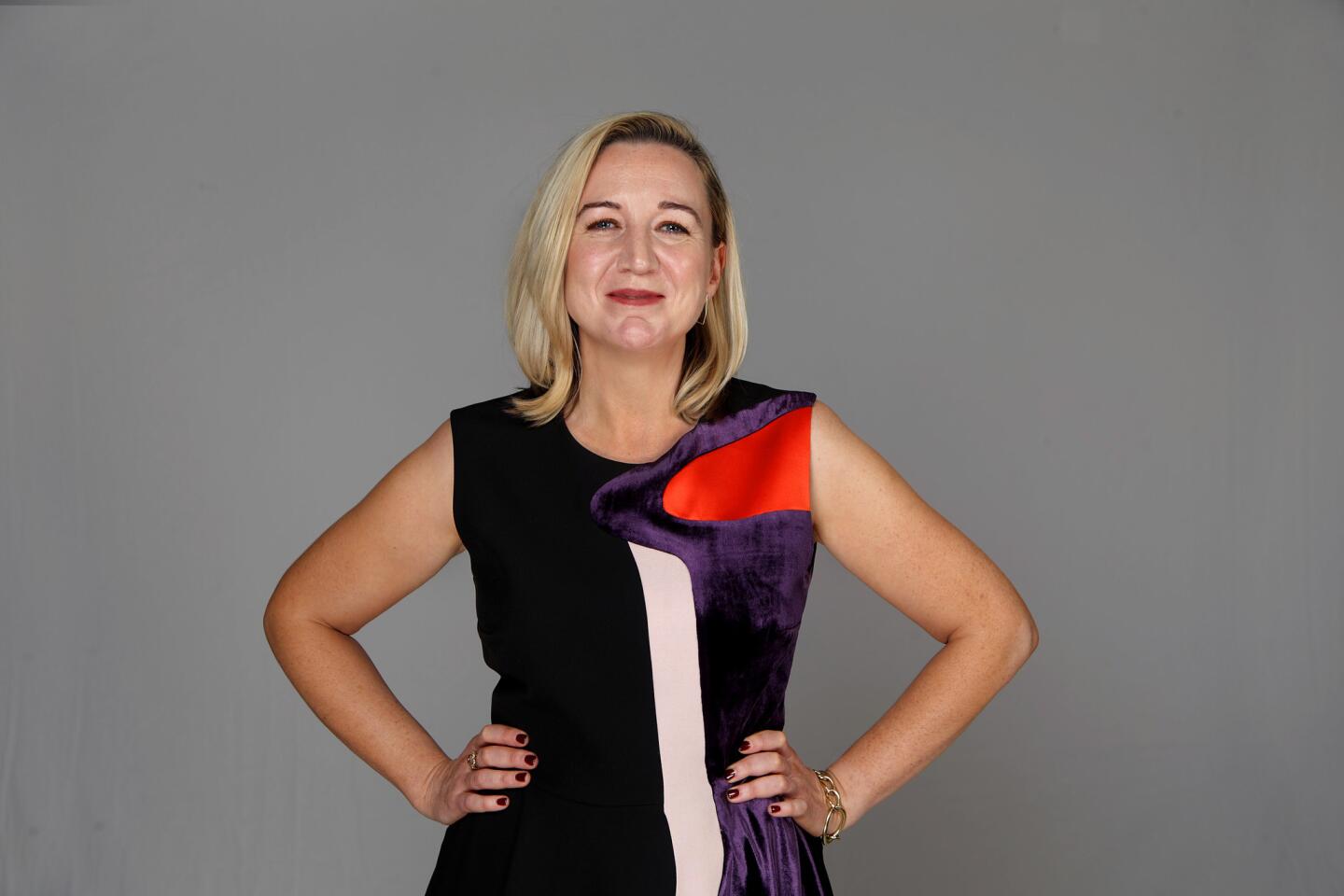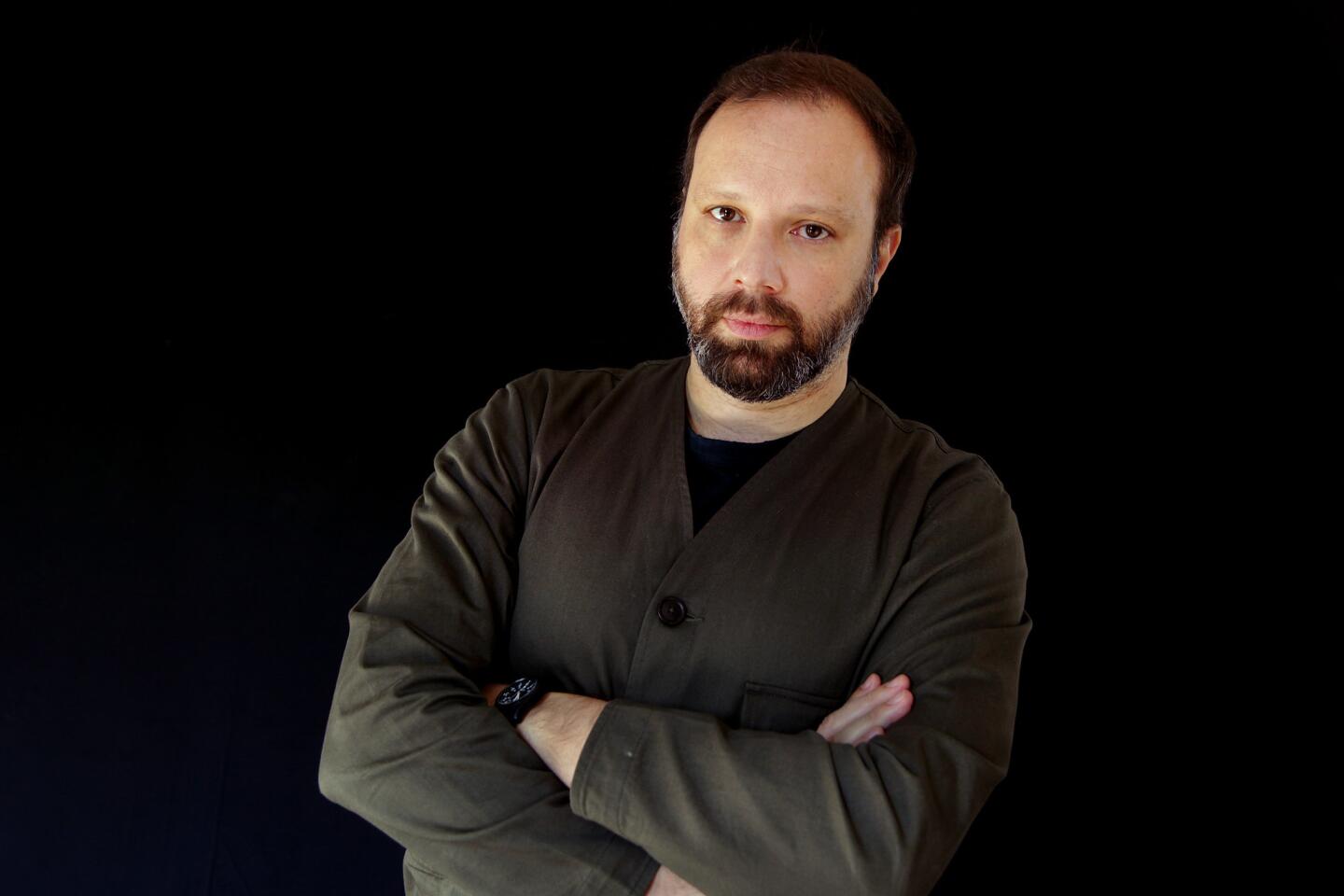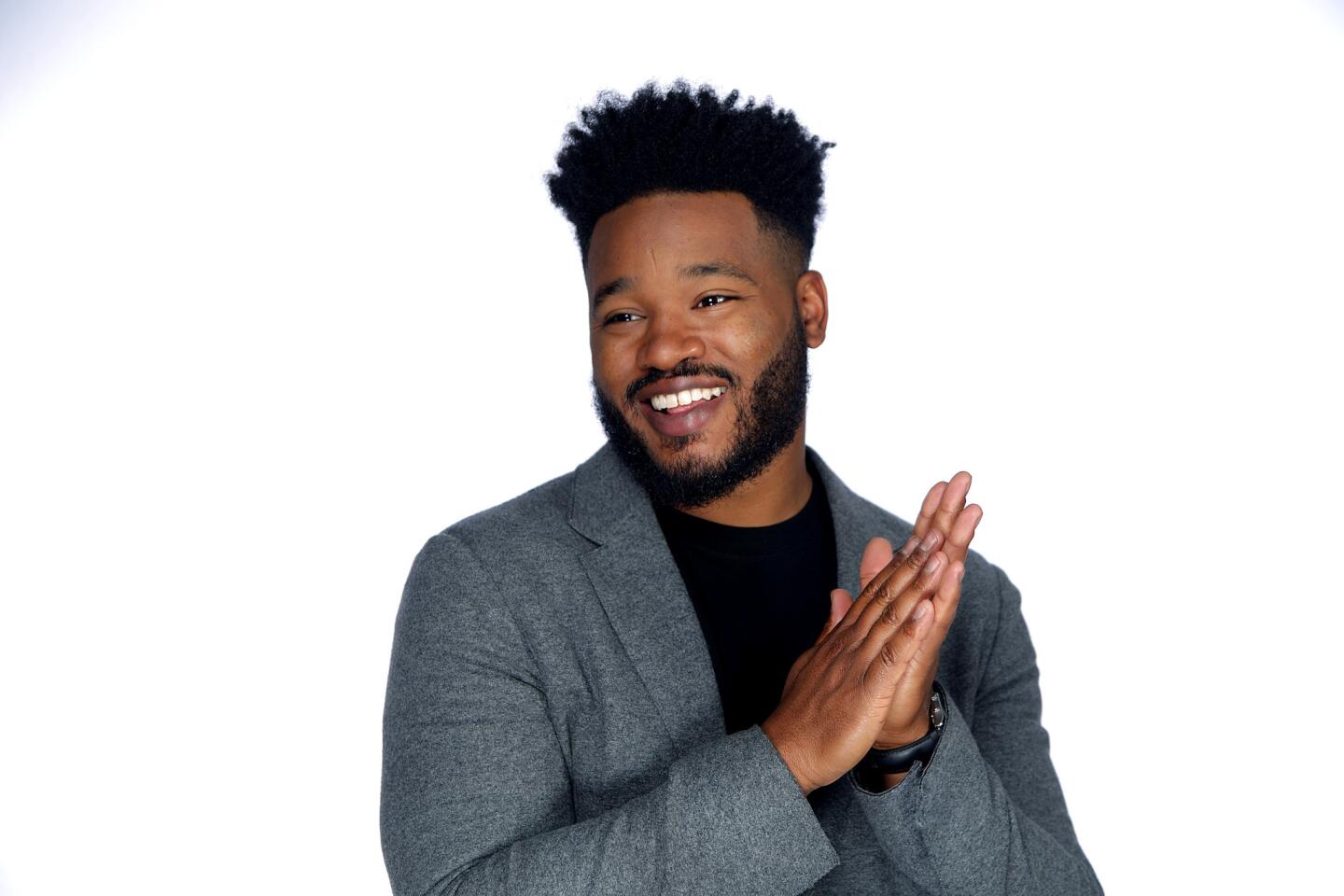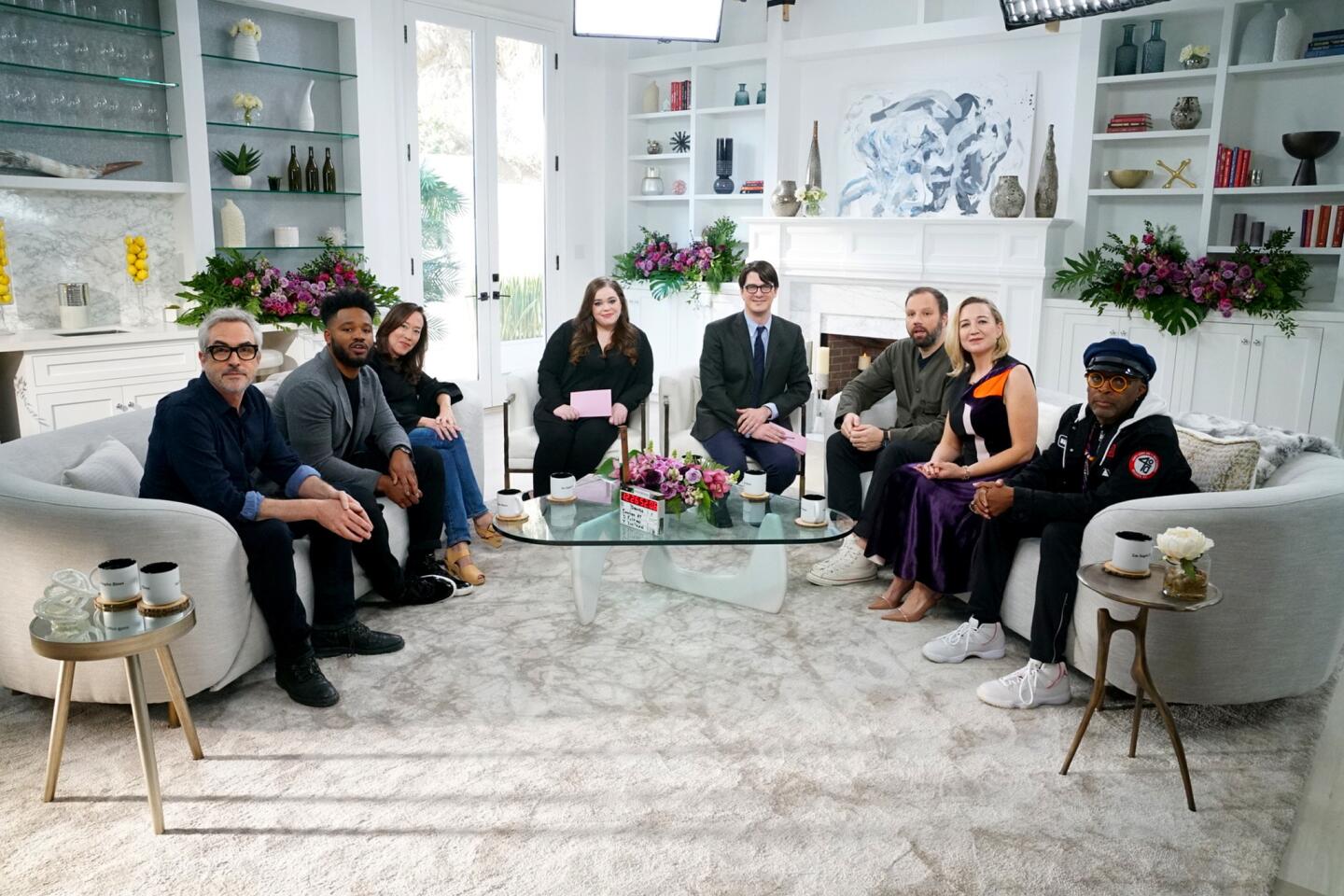The Directors Roundtable: Six directors talk influences and legacies, Netflix and iPhones, James Bond and Auto-tune
One of the many joys of watching movies – in any format, on any platform – is the way in which they can make the world seem both vast and intimate, able to take in wildly divergent stories while depicting them with vivid, up-close emotions.
This year’s Envelope Directors Roundtable features Greek-born Yorgos Lanthimos discussing his subversive English costume drama “The Favourite,” English-born Josie Rourke with her historical tale of a Scottish queen in “Mary Queen of Scots,” Brooklyn’s Spike Lee with his fact-based period satire on race and bigotry with “BlacKkKlansman,” Mexican-born Alfonso Cuarón with a personal story drawn from his childhood in “Roma,” Los Angeles-based Karyn Kusama with an intense L.A.-set crime story in “Destroyer,” and Oakland-born Ryan Coogler with his sharp, transcontinental upheaval of superhero conventions in “Black Panther.”
This eclectic group of directors found much common ground to discuss, from social and political messaging in film to the impact of Netflix and shrinking screens, to James Bond and the horror that is Auto-tune.
Here’s an excerpt of their conversation, edited for length and clarity.
Spike, in “BlacKkKlansman,” there’s a scene of people watching a movie, and it really brings up the idea of finding a space for yourself in the industry and within the history of cinema. Do you feel like that’s something you’ve been trying to do throughout your career?
Spike Lee: Well, I don’t know about throughout my career, but definitely with this new film. I mean, the film begins with “Gone With the Wind.” And then we go into “Birth of a Nation,” films that are supposedly the greatest American films ever made in cinema. So my first semester in NYU grad film school, we were shown “Birth of a Nation.” And we were told of the many innovations of D.W. Griffith, but they never brought up the social-political ramifications. The Klan was dormant. That film made the Klan come alive. Black people got lynched because of that movie. I also remember third or fourth grade, they reissued “Gone with the Wind.” It was a class trip and the teacher did not do anything to speak about the [racism in it]. So those two films are very personal to me.
Karyn, your last couple of films were made independently at the same time you’ve been directing television. Do you feel that you’ve had to consciously carve out a space for yourself outside of the studio system?
Karyn Kusama: I feel like as a director I’ve learned through some painful give-and-take that I just function best with a sense of creative authority on set and then beyond in the post phase. And then ideally in the marketing phase, it’s important to feel like you’re still a part of the voice of the film at all stages. And the lower my budgets are, the more possibility I feel to have that control. It’s just the decision I’ve made.

“Destroyer” director Karyn Kusama discusses casting Nicole Kidman in a role traditionally played by a man.
FULL COVERAGE: Get the latest on awards season from The Envelope »
And Josie, “Mary Queen of Scots” is your first feature film. Was the experience of making that movie as you expected?
Josie Rourke: The thing that really struck me is that it’s an athletic act. I mean I had never been paid to work outdoors when I went to the highlands of Scotland and shot this movie. But, you know, it’s not just about physical athleticism or endurance. It’s also about a political athleticism. And it’s about a rigor and holding on to what you really believe in and giving clarity. It’s not that theater’s not like that, but there’s a gigantic difference of scale, and also there’s just the plurality of voice I think in [the film] space that you have to learn to negotiate and that takes enormous strength.
Alfonso, your small, personal black-and-white film ended up at Netflix. Why did you feel like this was the right home?
Cuarón: Well, maybe you just defined why. You know, this is a film that due to finances is a Mexican film in Spanish, black-and-white, that if you see it through that filter — in a conventional market, particularly — it’s very challenging nowadays and very complex, the market for foreign films. And you start facing a lot of limitations. And what Netflix offered that was amazing is they saw the film past those filters. They went into the emotional core. And they’re doing an amazing job so far about taking it to theaters and then hopefully giving it a great life on the platform later on.
Lee: It’s very exciting and not just Netflix. I mean this is a good time to be a filmmaker … the more places that stream, they need product. They need people, they need young people. And it gives filmmakers an opportunity because there’s just more outlets.

“BlacKkKlansman” director Spike Lee and “Roma” director Alfonso Cuaron lament the decline of cinema on the big screen.
From ‘A Star Is Born’ to ‘Roma’: The 2019 Oscars Buzzmeter »
But do you get hung up on this sort of existential crisis of like what is a movie, does Netflix redefine that?
Cuarón: I don’t understand why the definition of one of these platforms means not theatrical. I think that both things could be absolutely compatible. So in the best-case scenario, in a film that is highly successful in terms of economics like Ryan’s film ... How many months was “Black Panther” in theaters?
Ryan Coogler: Maybe four. Don’t hold me to that because I’m not sure, but around four.
Cuarón: Let’s say four months and that is an amazing run, amazing. But in the context of 20 years, 30 years — what I’m saying is that there was [always a limited film run] in theaters. And then now our films are going to live on in platforms no matter what. I think that if anything creates new options as Spike is saying because it’s not only about films from different cultures. It’s also about exploring different forms, different formats, maybe even different lengths.
Rourke: It’s so funny to have everyone say “theater,” “theater,” “theater” when you know, that’s the medium I spent my life in. I know you’re from that world as well, Yorgos, and you know we’re a 2,000-year-old medium. When they started that, they were like, “It’s a religious act. You need an amphitheater.” And then over the course of the next 2,000 years you can see a play in an 81-seat storeroom in Chicago. I’ve done a play in the Park Avenue Armory, which is the size of a block. One of the things that actually starts to push our craft forward as theater directors is to think about the different spaces in which we’re making that work. And so that’s a fascinating thing about cinema. It’s such a young medium, and that’s thrilling to think that this is the beginning of this change.

“The Favourite” director Yorgos Lanthimos discusses the differences between working in theater and film, while Spike Lee complains about people watching epic movies on mobile devices.
Yorgos, how do you feel that your background in theater informs the work you’re doing now in cinema?
Yorgos Lanthimos: What I learned and what I appreciate is you don’t have to come in with a very fixed idea of what you want to do and then, you know, set it up and show it. You can experiment. You can make mistakes. You can go in a different direction. You can learn with the people that you work with. The downside with film with all those different platforms is that you make a film that will be seen from, you know, an iPhone to a huge screen to a laptop.
Lee: I’m a professor of film [at NYU’s Tisch School of the Arts], and the first day of every semester I have a list of films. And I ask my students to raise your hand if you’ve seen this film. And especially David Lean films — “Bridge on the River Kwai,” “Lawrence of Arabia,” “Doctor Zhivago” — they say, “Yeah, I saw it, Professor Lee, but I saw it on my iPhone.” I’m like, “Oh, my God! ‘I saw “2001” on my iPhone?’” And then they watch it vertical.
Cuarón: So just like the little strip like this?
Rourke: Yes, like a postage stamp.
Coogler: But you can’t — Spike, you can’t …
Lee: I’m sorry. Call me a dinosaur, an old fuddy-duddy.
Coogler: I’m not going to call you that. I’m saying, you gotta see it from their perspective. Nobody’s screening “Bridge on the River Kwai” in Oakland right now.
Cuarón: Yeah, but why on the iPhone?
Coogler: That’s how they watch stuff. That’s their world. I got a brother who’s six years younger than me and he does stuff, like just six years’ [difference] and he does stuff I just would never understand.
Lee: It’s like Auto-Tune. I know, I know, but what happened to people singing? Aretha Franklin. James Brown.
Coogler: It’s just an instrument, a new instrument.
Cuarón: I don’t like it, but remember that people also said sound is killing cinema. Let’s see what these new masters create with [the iPhones].
Rourke: You know what Alexander Graham Bell said about the telephone. He said, “Years from now there will be one of these in every town.” You can’t predict what it’s going to do when you give, particularly young people, a new piece of technology. What was interesting for me going from theater to cinema, like, can I feel the audience? In theater you can really feel it. And for me that act of assembly, particularly when your work has a mission and a political life behind it and a drive, to sit among a group of people and watch that thing is tremendously important.
Kusama: This idea of a sustained experience that we agree to participate in together. Yes, you can sit in theaters where people are on their phone or they’re talking, but you’re there together for two hours and you’re not getting up and walking away and reheating dinner. You’re there together, sharing the time together.
Cuarón: But there’s another element of this [streaming idea]. The actress of “Roma,” Yalitza [Aparicio], she’s so happy the film is going on Netflix. And when you ask her why, she says, “Because I want my communities to see the film. And otherwise we’ll have to travel more than three hours to go to a theater, and we don’t have the resources for that.” You know, it’s how much you want to democratize the spread of your films.
Ryan, in your movie, “Creed,” there’s a moment where people are watching a James Bond movie and then in “Black Panther,” you’ve essentially sneaked a James Bond movie into the middle of the story with this cool casino fight and car chase. Do movies that you watch and love inform your filmmaking?
Coogler: I wanted to be a filmmaker because I love the way watching movies made me feel. So like this gentleman here [motions to Lee], legend has it in 1992 he said, “When ‘Malcolm X’ comes out, every black father should take his kid to see this movie.” Something along those lines?
Lee: It wasn’t just black families.
Coogler: My dad listened to this and took me to see “Malcolm X.” I was very, very young; I sat on his lap because the theater was packed. And I became very emotional while I was watching it. When Denzel [Washington] points his hand and all of the other people turn, I’d never seen a black man photographed like that. I’d never seen a black man that powerful on a hundred-foot screen. And when he got killed, both me and my dad, along with a lot of other people in the theater, cried. So now when I think about “Malcolm X” and I watch it, I think about my dad. That medium is so powerful, that’s the reason that I wanted to do it.
And the only way that I get the motivation or the confidence that maybe I can make a film work is by looking at other films that made a similar story work. So I do my homework when I get into making a certain type of film. When I sat down with Kevin Feige at Marvel Studios and they were talking to me about “Panther” and they said, “You know, we figure this could be our version of James Bond.” And I got really excited about that, like an African king who was also like a James Bond.
Lee: Which “James Bond,” though? Sean Connery!
Coogler: Have you watched any Sean Connery movies lately? Like, that couldn’t fly.
Rourke: No, that would no—
[laughter]

“Black Panther” director Ryan Coogler discusses the powerful impact of seeing Spike Lee’s “Malcolm X” with his father when he was a child.
Spike, what does that mean to you when you hear someone like Ryan or maybe some of your students at NYU talk about your influence on them?
Lee: I’m honored to hear that. And for me it’s a cycle. We just gotta keep going. I was very lucky to work with the great Ossie Davis and knew Gordon Parks and so those were people who I saw their films. Just keep it going. [To Coogler] Besides you, I was the second most happiest … about the success of your film. I mean, it’s a game-changer and it’s not about race or anything. This is just a [huge impact] in the industry no matter who you are.
Kusama: But also I think this idea of legacy and diversity that you bring up, like when I think about you, Spike, I think about “She’s Gotta Have it” and I think about seeing a movie in college in which I was able to see a woman with agency kind of wreak havoc in so many other people’s lives. And I was like, “Oh, God, I really like her.” I don’t know if this is the forum for how conscious you were of that being a somewhat radical choice to have Nola Darling exist.
Lee: It wasn’t all like that. It was half the black women saying it was misogynistic. So I was getting it from both sides on that.
Kusama: Complicated work often has to endure complicated conversations. But then cut to watching “Black Panther” in the theater with my son who is 11, and have him want to collect the action figures of all the female characters because he thought they were the coolest.
Coogler: Oh man. [“Black Panther”] is not just about stepping into the one single hero role but into something more expansive. It’s what “Roma” is asking us to do, step into a character we never really get access to. We don’t get to see life from that perspective. That’s what movies can do.
Yorgos, all of your movies have been about power dynamics, and in the “Favourite,” it’s very specifically about power dynamics among these three women. Did that feel distinct for you?
Lanthimos: We started this film like nine years ago, so back then I didn’t feel like I was doing something along the lines of the times. I just had read about this story about these three women and I went like, “Oh interesting, you can make a film with three female leads and you can create these complex characters.” Just normal stuff that you were supposed to be seeing in cinema but for whatever reason, it wasn’t there. I’m glad that that’s now happening and this film feels more relevant now, but at the same time, I tried to not make any comment about the fact that there’s homosexual relationships or anything like that. I just wanted to approach it as they have this power and how their relationships and their behavior and their decisions affect millions of other people. That’s what was more interesting.

Directors Yorgos Lanthimos (“The Favourite”) and Josie Rourke (“Mary Queen of Scots”) discuss their approaches to feminism in their filmmaking and updating their period dramas for 2018.
FULL COVERAGE: Envelope Live 2018 screening series »
Josie, your film is also a period piece about powerful women. Did you feel like you wanted to bring out some of the more feminist characteristics?
Rourke: There’s been a sudden outbreak of looking more carefully, and this just happens to be where I’ve been directing my attention for my career. There are people of color playing characters we know historically were white in “Mary Queen of Scots.” That was just something I was really clear about with Focus [Features] and Working Title: “I will not make an all-white period drama. I would not do that in the theater. I will not do that in this film.” And they were cool about that, but partly because there is “Creed” and because there is “Hamilton” and because they understand that other people are shifting that cultural conversation.
There was a question at a “Destroyer” Q&A for Nicole Kidman about how her cop character was sort of masculine. How did you feel about the gender stereotype surrounding that?
Kusama: There’s also a somewhat casual aside that the role that she’s playing is something that would typically be played by a man. But I actually feel like the strength of the character comes from her vulnerability, her complexity, her irascibility but also a sort of tenderness. And I realize there’s an instinct in me to challenge the people asking that question or making that assumption of the film to offer women as many roles that men get that are as interesting. Like I hope that the progress is that we start not really looking at gender and race and ethnicities and just start having a broader conversation about, like, are we feeling a full humanity [in this character]?

Director Ryan Coogler describes the political subtext of the fictional African country in the film “Black Panther.”
With an action movie like “Black Panther,” are you still thinking about it in a political way?
Coogler: “Black Panther” is inherently about an African politician in a country that’s fictitious, but what’s fictitious about it is directly pointing a finger at the presence of colonization. It’s a country that escaped colonization and maintained its independence and dominion over their resources. That’s why they’re a superpower. So the film is going to be political. It’s going to deal with colonization. It’s going to deal with what it means to be African. So we were able to lean into those things. I’m actually more impressed when people are able to deftly handle those things that aren’t [so literally in the plot]. Like with “Roma,” you know, I’m watching a film about a domestic worker. As soon as the kid tells the nanny, “Hey, why do you talk like that?” I’m like, “This is a colonization issue here. These are the indigenous people who at some point or another had been conquered and now she’s speaking another language. So it was almost like the inverse of what we were talking about. For [“Black Panther”] it was easy. It was right there on the surface.
Cuarón: Well it was easier because I was dealing with memories, and it’s the understanding of the person. There are maybe political elements to that understanding. But it was about doing things that made sense or that felt right, not so much about, “OK, here I need this comment.” The fact that you have the characters, by de facto there’s already a comment. When you have a domestic worker who has an indigenous background in a middle-class Mexican white family, there’s already something going on.
Lanthimos: That’s the great thing about other people speaking about your films, and that’s why I always feel uncomfortable explaining things because I can’t really see the way other people see it, you know. I’ve made it. I’ve spent so much time with it. I can give you a very limited truth about something that I made, but you know it’s going to be much more interesting and insightful if someone else sees the film -- what it means for them and what it does to them and how it affects them. I think that’s the reason you’re actually making it, to give it out to the world and each different person will perceive it in a very personal way — hopefully, if it works.
More to Read
From the Oscars to the Emmys.
Get the Envelope newsletter for exclusive awards season coverage, behind-the-scenes stories from the Envelope podcast and columnist Glenn Whipp’s must-read analysis.
You may occasionally receive promotional content from the Los Angeles Times.
